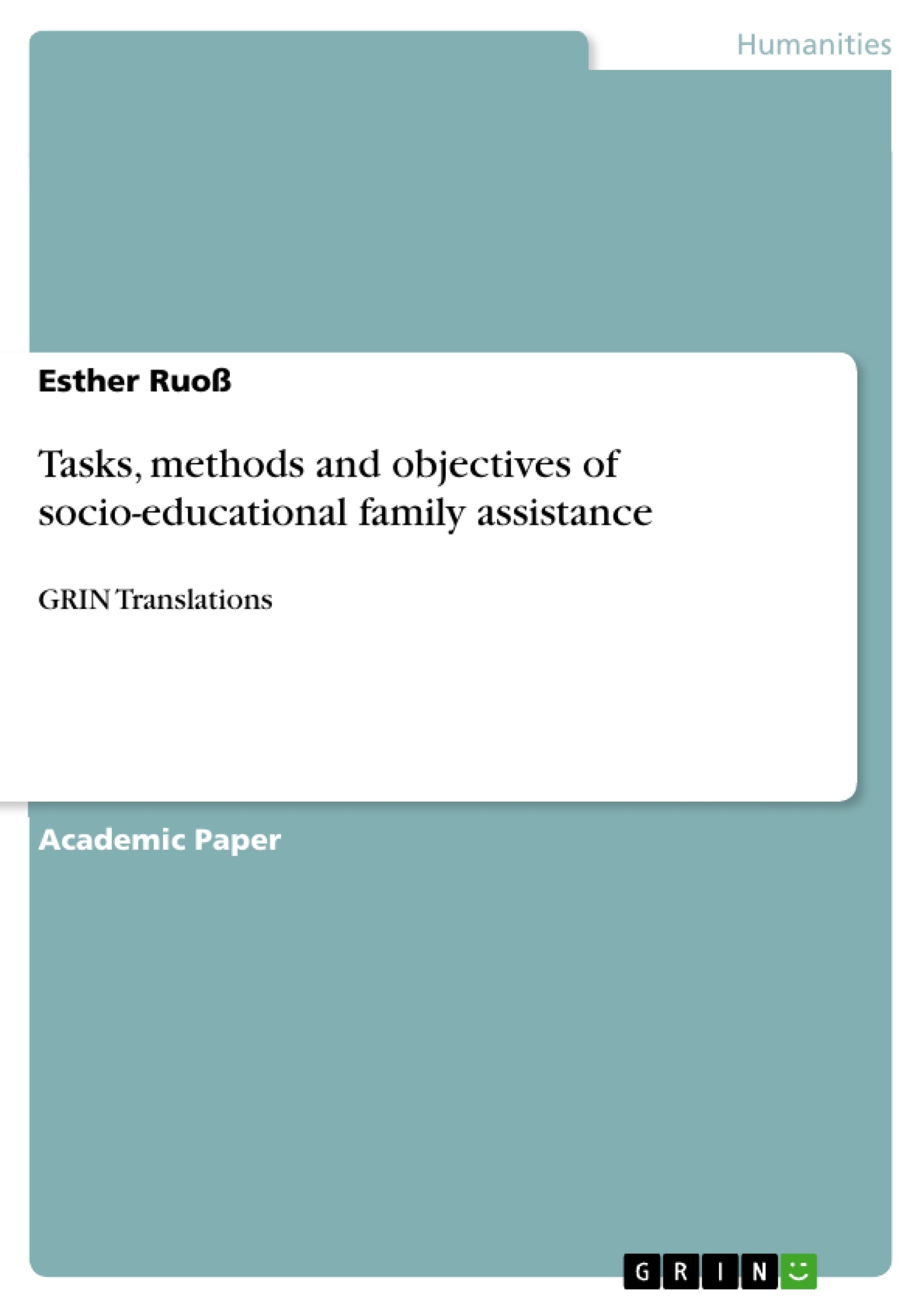This text was translated with the help of AI and reviewed by the GRIN editorial team.
During my second internship semester, I was able to familiarise myself with the work of Sozialpädagogische Familienhilfe (SPFH). SPFH is a very varied and interesting field of work and, in my opinion, has a very good starting point for socio-pedagogical work in educational support because it involves the whole family - parents and children alike. SPFH works with families who usually have to deal with several difficulties and problems at the same time - in the language of resilience research, these are families with multiple risk burdens. Children from such families must have a high level of resilience in order to be able to develop normally despite the adverse circumstances.
The SPFH in Germany had its beginning in the 60s in Berlin. Out of an emergency situation – at that time all homes were overcrowded – the then Berlin home manager of all state children's homes – Martin Bonhoeffer – had the idea of having five children who needed temporary care, instead of in the home, cared for by an unemployed friend in the children's apartment. At that time, however, this was not approved by the responsible district office. In 1969, Bonhoeffer's idea was followed by a group of educators, social workers, sociologists and pedagogues who founded the association "Berliner Gesellschaft für Heimerziehung e.V." and whose aim was to develop new educational concepts and strategies.
Bonhoeffer's group developed his idea of an alternative to external accommodation and so, for the first time, five children whose mother had to go to the hospital could be cared for at home instead of in the home. Due to this successful first mission, further deployments of the family assistance offer could be carried out. The beginnings of the SPFH therefore lie in family care, in order to continue to ensure the care of the children and the housekeeping in the absence of the mother or the main care person. Even today, the SPFH is sometimes still confused with family care.
Inhaltsverzeichnis (Table of Contents)
- Introduction
- Emergence of the socio-educational family assistance
- Models of socio-educational family assistance
- Framework conditions for work in families.
- Framework conditions for the work of family helpers.
- Legal basis
- General conditions
- Target groups
- Environment
- Problems
- Tasks and objectives
- Methods of socio-educational family assistance
- Help plan discussion
- Life world or everyday orientation
- Empowerment and resource orientation.
- Systemic approach
- Procedure of a care by the Sozialpädagogische Familienhilfe.
Zielsetzung und Themenschwerpunkte (Objectives and Key Themes)
This text explores the development, implementation, and application of socio-educational family assistance (SPFH) in Germany. The primary objective is to provide an in-depth understanding of SPFH as a crucial intervention for supporting families facing diverse challenges. It aims to highlight the historical context, theoretical underpinnings, practical approaches, and legal framework surrounding SPFH.
- Historical development of SPFH in Germany
- Diverse models of SPFH implementation
- Key legal aspects and frameworks surrounding SPFH
- Target groups and their specific needs
- Methods and approaches used in SPFH practice
Zusammenfassung der Kapitel (Chapter Summaries)
The introduction provides an overview of the SPFH, highlighting its versatility and importance in socio-educational work. Chapter 1 traces the origins of SPFH back to the 1960s in Berlin, emphasizing its evolution from family care to a comprehensive educational aid. Chapter 2 delves into various SPFH models, encompassing different organizational structures, qualifications of family helpers, and the potential impact of non-permanent positions on the quality of work. Chapter 3 outlines the legal basis of SPFH, while Chapter 4 focuses on the general conditions and framework within which SPFH operates. Chapters 5 and 6 explore target groups, their specific needs, and the tasks and objectives of SPFH. Finally, Chapter 7 examines the methods of SPFH in detail, exploring key approaches such as help plan discussions, life-world orientation, empowerment and resource orientation, and a systemic approach. The text also discusses the specific procedures involved in SPFH care.
Schlüsselwörter (Keywords)
The text focuses on the socio-educational family assistance (SPFH), a key intervention in child and youth welfare. Important themes include the historical development of SPFH, diverse models of implementation, legal frameworks, target groups, methods of practice, and the impact of SPFH on families facing multiple risk burdens. Key concepts such as empowerment, resilience, and systemic approaches are also discussed.
- Quote paper
- Esther Ruoß (Author), 2007, Tasks, methods and objectives of socio-educational family assistance, Munich, GRIN Verlag, https://www.hausarbeiten.de/document/1465923


